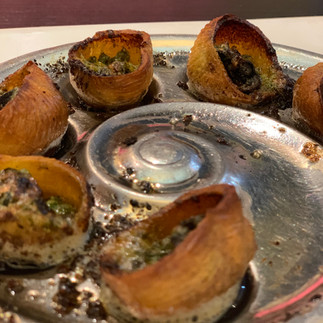Conquering Culinary Fears: A Guide for Cautious Travelers
- Andrea Reid
- Jul 4, 2024
- 4 min read
Traveling abroad is an exciting adventure, but for some, the idea of trying unfamiliar foods can be daunting. Fear of eating abroad is more common than you might think, and it can stem from concerns about food safety, upset stomachs, dietary restrictions, or simply the fear of the unknown. Let’s talk about how to navigate feeling uncertain about eating abroad. If you can overcome it, you can open your palate and embrace the cultural richness of places near and far!
Understanding the Fear
First, let’s talk about why some people are afraid of the food outside the US:
Is it Safe? I know we’ve all seen horror stories or even experienced the dreaded “travelers’ diarrhea”, right? Nothing is worse than being away from home and needing to run to the toilet every few minutes.
Dietary Restrictions: Even stateside, it can be extremely difficult to navigate eating out when you have food allergies or adhere to a restricted or special diet of some sort. It’s even harder when you’re not familiar with the dishes and don’t speak the language.
Cultural Differences: You know that feeling you get when you go to your friend’s house on Thanksgiving for the first time and you’re not quite sure when to grab a plate or when to start eating? Do they say a corporate grace, do we all say our own? Do the kids go first or the elders? Cultural differences, especially surrounding food can certainly produce anxiety.
Lack of Familiarity: When food looks or smells different than how you’ve seen it before, it can be off-putting. Especially if you’re a picky eater to start. Certainly foods you’ve never seen before can make even a foodie sheepish at first.
Now, I know what you’re thinking! “I thought you were supposed to be talking me OFF the ledge!” And I am! So now that we’ve addressed what your concerns are, let’s talk about ways you might overcome them.
Tips for Overcoming Food Fears
Do Your Research:
Before your trip, research the local cuisine and typical dishes of your destination. Understanding what to expect can alleviate some of the anxiety.
Look up reputable restaurants and street food vendors that have good reviews for cleanliness and quality.
Social media is a HUGE treasure trove of information and recommendations about food, restaurants and things you might want to try! I know some people that make their travel plans strictly around Tik Tok restaurant recommendations! Talk about a foodie!
Start Slowly:
Begin with familiar dishes that include ingredients you know and like. For example, if you're in Italy, start with pasta dishes before venturing into more exotic options like trippa alla romana (Roman-style tripe).
Gradually introduce new foods into your diet to build confidence and expand your palate. Maybe don’t douse your food in the sauce that’s on the table at first.
Try ordering an unfamiliar dish for the table or at least a few of you to try. That way, you all share the risk and you don’t commit your whole dinner to something you may not like.
Ask Questions:
Don’t hesitate to ask restaurant staff about how dishes are prepared or what ingredients they contain. Most places are happy to accommodate dietary restrictions and preferences.
Learning a few key phrases in the local language, such as “Does this contain nuts?” or “Is this dish spicy?”, can be incredibly helpful.
Ask your server what they recommend. Chances are, you’re in a touristy area and they’re used to foreigners. They can offer advice based on how adventurous you’re feeling.
Observe and Learn:
Watch how locals eat and follow their lead. This can help you understand how to properly enjoy the food and ensure you're eating it safely.
Take food tours or cooking classes to gain a deeper understanding of the local cuisine and its preparation methods.
Stay Hydrated and Bring Snacks:
Drink bottled or filtered water to avoid any potential waterborne illnesses.
Carry snacks from home that you can fall back on if you’re unable to find suitable food options. Usually you can bring any prepackaged, non-perishable, unopened items with you.
Use Technology:
Utilize apps and websites that cater to travelers with dietary concerns, such as HappyCow for vegetarians and vegans or AllergyEats for those with food allergies.
Translate menus and ingredient lists using translation apps to ensure you understand what you're ordering.
Embracing the Experience
Eating abroad can be one of the most enriching aspects of travel, offering a window into the culture and traditions of a place. Here are a few reasons to embrace the culinary adventure:
Cultural Connection: Food is a universal language that brings people together. Sharing a meal with locals can lead to meaningful interactions and a deeper appreciation of the culture.
Memorable Experiences: Some of the most memorable travel moments come from trying new foods, whether it’s a pub in England, the Iftar after fasting in Dubai, or a quiet trattoria in Rome.
Personal Growth: Stepping out of your comfort zone and overcoming food fears can boost your confidence and make you a more adaptable and adventurous traveler.
Now with all that being said, understand that you are taking some risks. And risk, by nature, involves some wins and some losses. For example, in Egypt, I think most of us had more losses than wins with regard to the food! But we did it! We survived! We used A LOT of Imodium, but we survived! Overcoming the fear of eating abroad is a journey in itself, one that can lead to incredible culinary discoveries and unforgettable travel experiences. By taking small steps, staying informed, and embracing the adventure, cautious travelers can transform their apprehensions into a love for global cuisine. So, take a deep breath, grab your fork, and dive into the delicious world that awaits you. Bon appétit and safe travels!













Comments